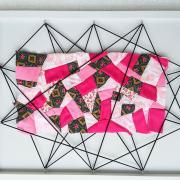Leeds theatre company Slung Low – which performs in least likely places – has opened a new college teaching weird and wonderful subjects.

For Leeds-based theatre company Slung Low, all the world really is a stage. With an attitude of ‘let’s do the show right here!’ its actors have popped up to perform on trains, in castles, in swimming pools, on fishing boats, on a floating stage at Hull’s Victoria Dock, and in city centres. ‘We make theatre adventures in unlikely places,’ says Slung Low, which, while true, also sounds like a massive understatement.
In 2013, the company – crewed by over 600 volunteers – performed Blood and Chocolate on the streets of York, playing to an audience of 300 every night. Then, in 2017, Slung Low headlined Hull’s UK City of Culture year with a production called Flood, a four-part show performed online, live and on the BBC to an audience of over half a million. Each live performance of Flood had its own community cast, made up of 80 Hull 2017 volunteers.
It’s hard enough putting on a play in an actual theatre with a small cast but putting on a show with a huge cast in the middle of a town, or on a boat, sounds like a nightmare of epic proportions. But Alan Lane, Slung Low’s artistic director, is a man who isn’t easily fazed.
During each performance of Blood and Chocolate, Lane and his cast had to contend with York’s rowdy stag and hen parties who had plainly been enjoying large amounts of liquid refreshment. On one evening, a road the actors were supposed to be performing in had to be closed suddenly because of an electrical fault. ‘And on the last three nights it rained as though it was the end of the world,’ Lane adds. As the person controlling all the action, you have to be able to think fast when crisis strikes.

Another time, the company staged a production on a train departing from Harrogate station. ‘It was just a normal train and we had to buy the audience tickets,’ says Lane, cheerfully. ‘The problem was if the train was late we had to improvise new scenes to make sure our timings were bang on. That production ran for two weeks – and the train was late every single time.’
So how does Lane deliver these vast, critically acclaimed productions while entertaining audiences, keeping his sanity and retaining the goodwill of his cast and crew?
Well, first, he says, it’s crucial to understand the motivations of the volunteers he’s working with. It’s important for him to learn everyone’s name and make sure they’re getting something positive from the experience. ‘People take part in our shows for different reasons,’ he says.
Secondly, it’s key to give crystal clear direction at all times, otherwise chaos is a real possibility. With large scale shows, everyone wears a headset so Lane can talk to them, which was particularly important with Flood, which featured people in boats and pyrotechnics.
Plus, when you’re directing a large, alfresco theatrical production, compromise is the name of the game – he knows that what you want is not necessarily what you’ll end up with. ‘You have to accept that getting the show done is more important than getting it done perfectly,’ says Lane, who most recently directed Handlooms, a play performed in a sari shop, for Rasa Theatre and Contact Theatre.
‘If you start being finicky, before you know it, the boats are out of control and the cast start to lose their faith in you. A lot of the time, directing these big shows is about holding enough confidence for everybody so they don’t have to hold it themselves. If they believe you’ll see them right, you’ll get them home safely and you’re going to put them in a production that’s worth all their effort, then they’ll go with you. That’s the part of my job that I cherish. That’s the best part.’
After the success of Flood, which won a Royal Television Society Award, it’s safe to assume Slung Low – which is funded by the Arts Council – could now do anything it wants. But instead of putting on larger shows or getting another TV production off the ground, the company is opening a Cultural Community College, which will teach everything from stargazing, decorative blacksmithing and working with power tools, to CPR, south Indian cooking and short film-making.
The college, which launches this month, is located in The Hub, Slung Low’s home in the Holbeck area of Leeds. This is a building with an 85-seat theatre which is available as a rehearsal space for young and emerging artists and as a performance space for visiting artists and touring companies (this month, for example, Daisy Campbell, daughter of the late actor, writer and director Ken Campbell, will be appearing to perform a one-woman show about her father).
Audiences who come to see shows at the Hub, and artists who want to hire out the space, do so under a ‘pay what you decide’ system. ‘We recognise that people come from different financial backgrounds,’ says Lane. ‘So the decision they make is based on what they can afford, or how much they think it’s worth.’
The Cultural Community College, which is supported by the Paul Hamlyn Foundation and the Arts Council, also operates on a ‘pay what you decide’ basis. ‘Education tends to be market driven,’ says Lane. ‘It’s expensive to be a student. It felt like there was a gap we could fill.’
The first course at the college will be stargazing, which fulfils Lane’s remit of being fascinating but fundamentally useless. ‘Stargazing is profound,’ he says. ‘You look at the galaxy and come to understand your place in the universe. It’s beautiful and important – but it’s not useful. We have to start thinking about different ways of valuing things.’
Slung Low, which officially formed in 2000, moved to the Hub 10 years ago where it’s run by a team of four. The company got its name – and I presume Lane is being serious – because of a wardrobe malfunction that used to regularly befall him and his colleagues. ‘We were kids of about 20,’ he says, ‘and our trousers used to fall down because we didn’t have belts. We were appearing at a festival and someone said: “Come on! You’ve got to come up with a name!” We said: “Oh... call us Slung Low...” ‘Now we definitely all have belts. Which is just as well: no-one wants to see my old backside.’ Slung Low is always looking for ways to reinvent itself. ‘The college is our next challenge,’ says Lane. ‘It’s a great way to push our values and provoke conversation about what theatre companies should do when they are given a bit of profile – and funding.’



























